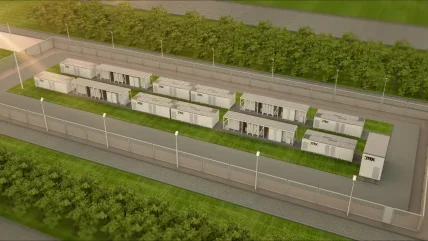
DTEK Group, a private investor in Ukraine’s energy sector, has announced a €140m investment plan to construct a series of battery energy storage systems (BESS) in the country with a combined capacity of 200MW.
The new project aims to strengthen Ukraine’s energy security and support the transition to a greener energy system.
DTEK Group aims to commission the new storage systems by September 2025. Once operational, these energy storage facilities will provide ancillary services to Ukraine’s Transmission System Operator Ukrenergo.
The services will include automatic frequency restoration reserves, which DTEK Group secured the rights to offer following a competitive auction held on 22 August 2024, alongside other industry participants.
The agreement encompasses several assets which are distributed across various locations in Ukraine.
DTEK CEO Maxim Timchenko said: “Despite the war and limited access to international capital markets, we continue to invest in Ukraine – not only to restore destroyed infrastructure, but also to build new facilities in line with our long-term strategy.”
“DTEK was the first company to start building energy storage systems and open this market in Ukraine back in 2021.
“Our priority remains unchanged: to develop green energy in Ukraine, accelerate the integration of the country’s energy system into Europe and to strengthen our country’s energy security.”
According to DTEK Group, the project will accelerate the development of Ukraine’s energy storage market. It will also boost the country’s storage capacity.
Battery technology plays a crucial role in decentralising Ukraine’s energy system to mitigate the impact of energy supply disruptions caused by Russia, said the energy investment company.
By transitioning from a system reliant on a few large power stations to one supported by numerous energy sources, Ukraine aims to stabilise supply and demand with the help of energy storage systems.
In addition, DTEK Group and other energy companies are focused on repairing existing power generation infrastructure to face the upcoming winter. The parties are also deploying new technologies to shift towards a decentralised energy system.
Earlier in May this year, Ukraine’s energy minister German Galushchenko said that Russian drone and missile attacks on the Ukrainian energy infrastructure have caused more than $1bn worth of damage.
Since March 2024, the Russian forces have been attacking Ukrainian thermal and hydropower stations, along with main networks, leading to blackouts in several regions.






